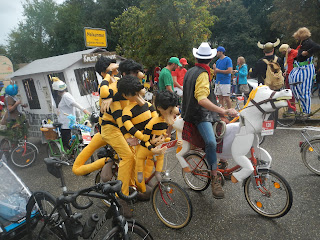Accompanied Bicycle, Tandem and Trike Transport on Long Distance Daytime German Trains
Rail services in Germany are divided into two groups: Long distance (Fernverkehr) - non subsidized and regional trains (Nahverkehr)
- local services provided by an operator and subsidized by a regional
transport authority but ultimately by the provincial government. The
long distance services are there to make a profit. Both types of service
cooperate. Your journey might involve travelling on both long distance
and regional services. Both types of service have in some cases the
capacity to carry bicycles and even tandems and trikes.
Deutsche Bahn (DB) Long Distance Services Deutsche Bahn operates by far the majority of long distance passenger trains in Germany (https://www.bahn.com/en/view/index.shtml). It is a state-owned operator that makes a profit on its long distance routes. Only a small proportion of these services offer bicycle transport. It appears to us that the ideal passenger is seen as someone who carries one credit card (rather than two) and MacBook Air. DB long distance services use two types of train: the high speed Inter City Express (ICE) and the slightly slower and cheaper InterCity/EuroCity trains (IC/EC). One of the five ICE classes will take a limited number of "normal" bicycles (in a cubby hole) as do many of the IC/EC trains. In the German conditions of carriage we discovered a surprising sentence (translated into English):
Deutsche Bahn (DB) Long Distance Services Deutsche Bahn operates by far the majority of long distance passenger trains in Germany (https://www.bahn.com/en/view/index.shtml). It is a state-owned operator that makes a profit on its long distance routes. Only a small proportion of these services offer bicycle transport. It appears to us that the ideal passenger is seen as someone who carries one credit card (rather than two) and MacBook Air. DB long distance services use two types of train: the high speed Inter City Express (ICE) and the slightly slower and cheaper InterCity/EuroCity trains (IC/EC). One of the five ICE classes will take a limited number of "normal" bicycles (in a cubby hole) as do many of the IC/EC trains. In the German conditions of carriage we discovered a surprising sentence (translated into English):
"Special
types of bicycles (e.g. tandem, recumbent) are not permitted on all
long-distance trains that carry bicycles for reasons of capacity. You can obtain further information from all DB sales outlets."
Next time we are in Mannheim and the ticket hall on the Hauptbahnhof
(Central Station) is not over full, we will chat to the staff to see
what this sentence actually means. We will report back here when we have
more information. I have checked with the ADFC, the German cycling club, the partner of DB in matters cycle transport, but I have yet to have a reply and I am not holding my breath.
Basically tandems and special designs (trikes, quads, trailers) are not normally transported by DB, but
there is at least one deceitful exception. In the days when I used to commute by
train to Frankfurt, I met a family who had a Hase Pino, a tandem which is
a cross between a recumbent and an upright. I asked the mother about
putting the tandem on an Inter City train and was assured that the wheelbase was
short enough to fit the bike in a single bike slot. Railway
employees had never noticed it was a tandem. The latest models are
demountable and can be divided before transport. A number of other
tandem models are sold with couplings allowing dismounting. Whether the
divided bike then counts as luggage in the same way as a folding bike? We don't know.
Flix Train (https://www.flixtrain.de/) offers a limited number of daytime connections in both directions between: Köln (Cologne) - Düsseldorf - Duisburg - Essen - Dortmund - Bielefeld* - Hannover - Berlin Spandau - Berlin Hbf - Berlin Südkreuz
*At present trains only stop in Bielefeld when travelling towards Berlin.
Köln (Cologne) - Düsseldorf - Duisburg - Essen - Gelsenkirchen - Münster – Osnabrück - Hamburg
These trains are cheaper than the DB trains, but are slower than the high speed ICEs. With their tandem or trike the happy trike or tandem rider is not welcome on these
trains. "Normal" bicycles are carried, but to quote the company's
conditions of carriage:
"Bicycles must be of a standard size, without
additional attachments, and may not exceed 20 kg (45 lbs). We
recommend that you book your bicycle slot early due to limited
capacity."











